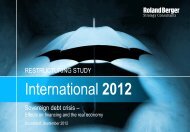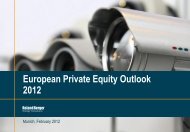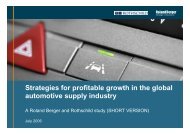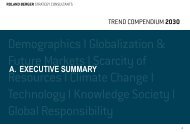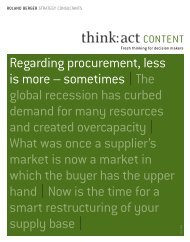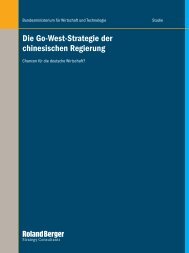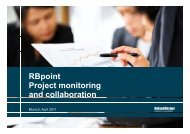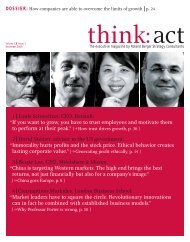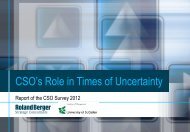How to reach emerging market consumers with new ... - Roland Berger
How to reach emerging market consumers with new ... - Roland Berger
How to reach emerging market consumers with new ... - Roland Berger
You also want an ePaper? Increase the reach of your titles
YUMPU automatically turns print PDFs into web optimized ePapers that Google loves.
<strong>Roland</strong> <strong>Berger</strong> Strategy Consultants<br />
color <strong>to</strong> village residents <strong>to</strong> decorate the outside of their houses.<br />
Another inexpensive Coca-Cola <strong>market</strong>ing initiative turns shipping<br />
containers, again painted Coca-Cola red, in<strong>to</strong> s<strong>to</strong>rehouses or retail<br />
s<strong>to</strong>res.<br />
Ecuador and Bolivia have embarked on a similar path. The<br />
indigenous principle of "sumak kawsay" (meaning "good living")<br />
was enshrined in the Ecuadorian constitution in 2008 and in the<br />
Bolivian constitution a year later.<br />
Hindustan Lever uses other techniques <strong>to</strong> build brand awareness.<br />
The company frequently employs street performers – magicians,<br />
singers, dancers and ac<strong>to</strong>rs – <strong>to</strong> promote soap and <strong>to</strong>othpaste.<br />
Lever and Ogilvy Out<strong>reach</strong>, a <strong>market</strong>ing arm of Ogilvy & Mather,<br />
recruits the local performers, adjusting their scripts in line <strong>with</strong><br />
local dialects, education levels and religions. A series of such<br />
performances in northeastern India saw consumer awareness<br />
of Breeze, a low-cost 2-in-1 soap, rise from 22% <strong>to</strong> 30%. A similar<br />
program <strong>to</strong> promote Rin Shakti, a moderately priced detergent<br />
bar and powder brand, boosted recognition from 28% <strong>to</strong> 36% over<br />
a six-month period.<br />
Increasing relevance of values and sustainability<br />
Religious values are important for many <strong>consumers</strong>. Increasing<br />
numbers of religious people will drive the <strong>market</strong> for "valuesoriented"<br />
products. By 2030, when the global population is<br />
forecast <strong>to</strong> exceed 8 billion, approximately a quarter of people will<br />
be Muslim. Pakistan will likely overtake Indonesia as the world's<br />
largest Islamic country, <strong>with</strong> a predominantly Muslim population<br />
expected <strong>to</strong> exceed 256 million. Christianity will remain the world's<br />
dominant religion, however, <strong>with</strong> the Christian population expected<br />
<strong>to</strong> be 2.2 billion by 2030. Most <strong>new</strong> Christian converts will live in<br />
<strong>emerging</strong> countries. Together, Islam and Christianity will account<br />
for over half the global population (53%) by 2030. The impact<br />
on consumer preferences will be significant – Muslim women's<br />
fashion and non-pork meat products are two commonly cited<br />
examples.<br />
Values in a broader sense – religious, environmental and social –<br />
will play a major role in <strong>consumers</strong>' purchase decisions and brand<br />
loyalties. We are already seeing a strong move in some countries<br />
<strong>to</strong> integrate non-economic values in<strong>to</strong> their economic perspective.<br />
Bhutan, for example, first formulated a <strong>new</strong> official measure of<br />
living standards, Gross National Happiness (GNH), <strong>to</strong> measure<br />
economic progress as early as 1979. The four pillars of GNH are:<br />
Pursuing equitable and equal socio-economic development<br />
Preserving and promoting cultural heritage<br />
Conserving the environment<br />
Ensuring good governance<br />
f9 We are seeing increasing efforts <strong>to</strong> measure well-being across the<br />
globe. The London-based "Centre for Well-being" compiles a Happy<br />
Planet Index <strong>to</strong> record life expectancy, experienced well-being<br />
and people's satisfaction <strong>with</strong> the environmental impact of the<br />
goods and services consumed. Costa Rica scores highest, followed<br />
by Vietnam. Most of the other <strong>to</strong>p 10 are <strong>emerging</strong> countries in<br />
South America. Germany and the United States, <strong>with</strong> their large<br />
ecological footprints, rank 46th and 105th respectively.<br />
f10<br />
According <strong>to</strong> a recent goodpurpose® study by Edelman, <strong>consumers</strong><br />
in "rapid growth economies" (RGEs) such as China, India,<br />
Indonesia, Malaysia, UAE and Brazil have much higher ex pectations<br />
of brands and corporations <strong>with</strong> regard <strong>to</strong> social issues. As<br />
the middle class grows and acquires more purchasing power,<br />
<strong>consumers</strong> in RGEs demonstrate a commitment <strong>to</strong> "social<br />
purpose" across many different activities, such as buying, sharing,<br />
donating and volunteering. This commitment is considerably<br />
stronger than that found for many <strong>consumers</strong> in "bear" <strong>market</strong>s<br />
such as Western Europe.



